News Story
CEPP’s Top 10 Accomplishments in 2022
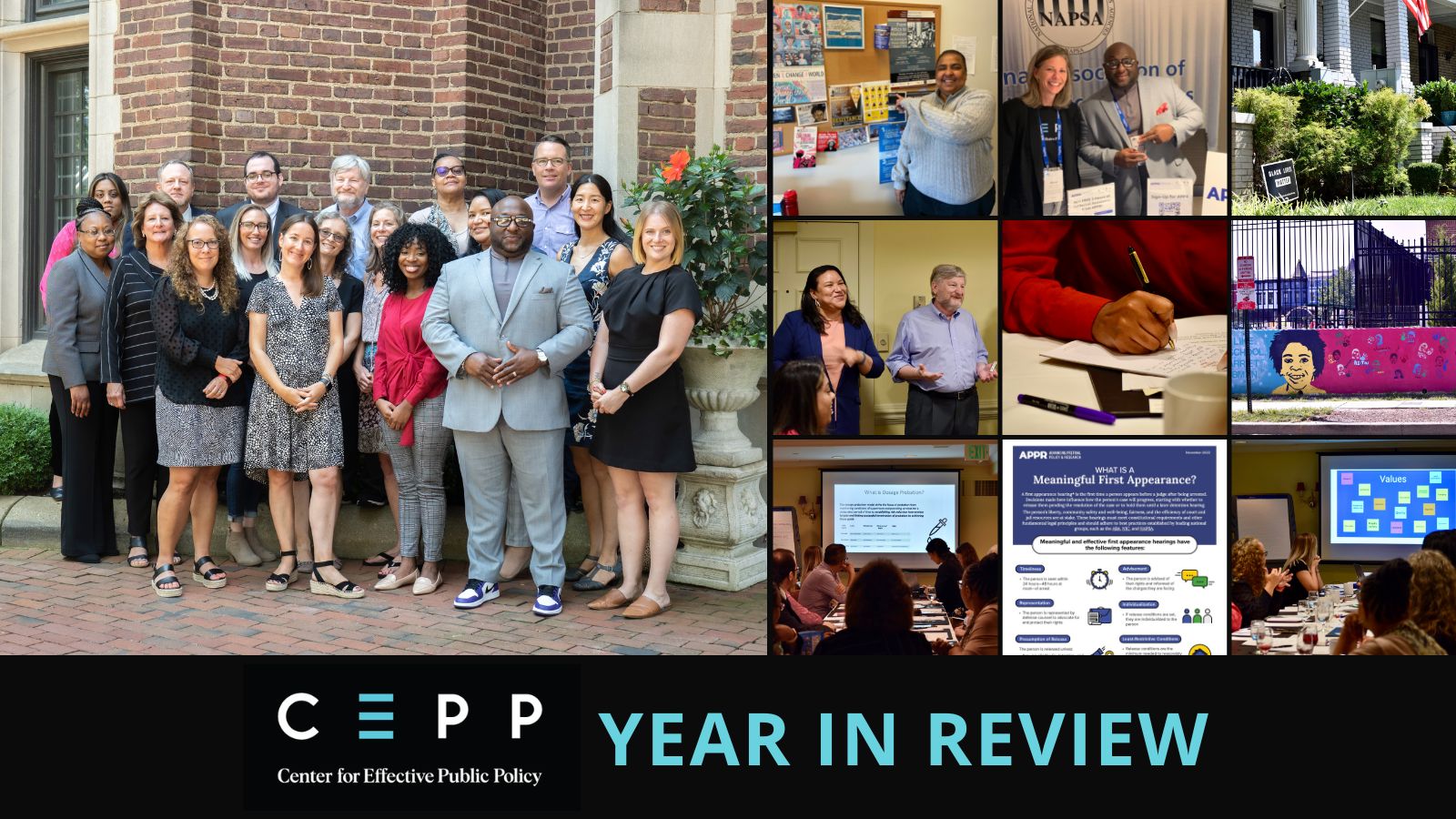
Learn what CEPP achieved for the criminal justice field this year.
The year 2022 was an important one for the Center for Effective Public Policy. Not only did we expand our work in critical areas like racial equity and justice-involved women, but we also added five new team members (and counting!) to expand our capacity and impact. We couldn’t have achieved as much as we did without our tremendous staff, our generous funders and supporters, and our system and community partners, who work tirelessly alongside us to reimagine justice solutions, advance change, and strengthen community well-being.
We’re excited to share our list of CEPP’s top 10 accomplishments this year!
1. CEPP expanded its work addressing the unique needs of justice-involved women.
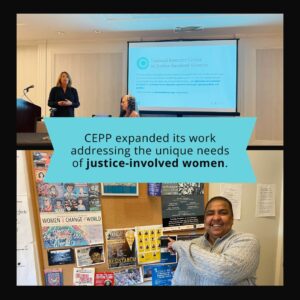 Women are the fastest-growing group of people impacted by the criminal justice system. CEPP’s National Resource Center on Justice-Involved Women (NRCJIW) collaborates with government agencies to provide training, technical assistance, and information to federal, state, and local criminal justice systems on evidence-based strategies that contribute to women’s increased success. That work broadened this year to help facilities in Florida, Oregon, and Washington evaluate and expand their use of gender-responsive and evidence-based policies and practices.
Women are the fastest-growing group of people impacted by the criminal justice system. CEPP’s National Resource Center on Justice-Involved Women (NRCJIW) collaborates with government agencies to provide training, technical assistance, and information to federal, state, and local criminal justice systems on evidence-based strategies that contribute to women’s increased success. That work broadened this year to help facilities in Florida, Oregon, and Washington evaluate and expand their use of gender-responsive and evidence-based policies and practices.
NRCJIW is also working in collaboration with BIPOC-impacted women to develop a culturally competent resource that will help women navigate the complex journey from incarceration back to the community.
CEPP’s senior advisor, Dr. Marilyn Van Dieten, shared NRCJIW’s work with hundreds of people at the American Probation and Parole Association’s 47th Annual Training Institute this past summer in Chicago. All of this work—and much more—is highlighted on NRCJIW’s newly redesigned website.
2. CEPP continued to be a force for pretrial justice.
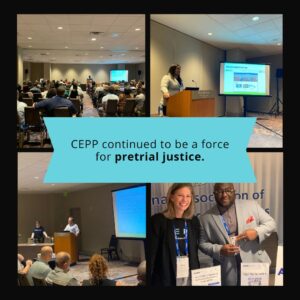 Pretrial justice is one of CEPP’s key focus areas. This year, we continued to manage the Advancing Pretrial Policy and Research (APPR) initiative and provide the field with indispensable resources, training, and technical assistance. Review our accomplishments on the APPR website.
Pretrial justice is one of CEPP’s key focus areas. This year, we continued to manage the Advancing Pretrial Policy and Research (APPR) initiative and provide the field with indispensable resources, training, and technical assistance. Review our accomplishments on the APPR website.
We also supported the evaluation and implementation of the Public Safety Assessment in several California counties, providing judicial officers with another tool to make more informed, fair, and less restrictive pretrial release decisions. And, we worked with practitioners in North Carolina to analyze existing policies, review local jail population data, and offer advice on developing pretrial services.
We had the opportunity to share our work with hundreds of leaders at this year’s National Association of Pretrial Services Agencies Annual Conference and Training Institute in Atlanta.
3. CEPP made racial equity a sustained focus throughout our work.
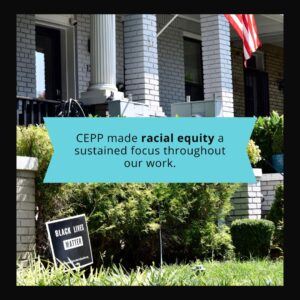 CEPP addresses structural racism and inequity head-on in its work and facilitates difficult conversations between community and system stakeholders. We examine local policies and data for racial and ethnic disparities, and we provide guidance on how to effect meaningful change.
CEPP addresses structural racism and inequity head-on in its work and facilitates difficult conversations between community and system stakeholders. We examine local policies and data for racial and ethnic disparities, and we provide guidance on how to effect meaningful change.
Through our racial equity and community engagement work with APPR, we engaged hundreds of practitioners in a series of racial equity workshops this year. The discussions highlighted how system improvements are most impactful when sites examine race and ethnicity data, incorporate community input and expertise, and measure outcomes. APPR also developed a comprehensive curriculum and workshop series on meaningfully engaging impacted people and communities.
This year, CEPP also started working with La Crosse County, Wisconsin, to deliver technical assistance and develop a Racial and Ethnic Disparities Strategy. In addition, CEPP partnered with the Council of State Governments Justice Center to support the expansion of their Stepping Up initiative to include a focus on racial equity at the intersection of criminal justice and behavioral health. CEPP is also part of the 2022 cohort of Qualcomm’s Racial Justice Giving Initiative to address the needs of BIPOC justice-involved women.
4. CEPP continued to be a national leader in the parole and probation fields.
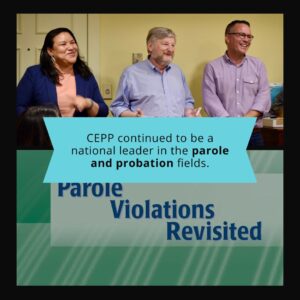 In addition to working one-on-one with 45 parole boards and counting in places like Georgia, Kansas, Nebraska, and Texas this year, CEPP was selected by the U.S. Department of Justice, Office of Justice Programs’ Bureau of Justice Assistance to create and manage its new Community Supervision Resource Center (CSRC).
In addition to working one-on-one with 45 parole boards and counting in places like Georgia, Kansas, Nebraska, and Texas this year, CEPP was selected by the U.S. Department of Justice, Office of Justice Programs’ Bureau of Justice Assistance to create and manage its new Community Supervision Resource Center (CSRC).
The CSRC will serve as a centralized hub for information for pretrial, probation, and parole supervision agencies around the country. Through this effort, we will synthesize and translate emerging research on supervision strategies, offer trainings and webinars, develop needed resources, offer technical assistance, and announce both private and public funding opportunities. The CSRC will intentionally focus on racial equity and centering the experiences of people and communities impacted by the criminal justice system.
5. CEPP engaged policymakers, practitioners, and communities to implement evidence-based policies and programs.
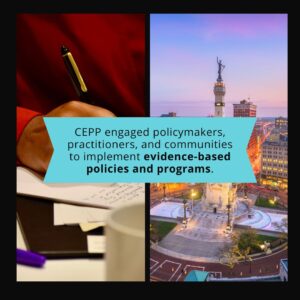 Public safety outcomes improve when criminal justice system stakeholders engage in collaborative partnerships, use research to guide their work and decision making, and work together to achieve community well-being. CEPP documented and piloted this approach in 2010 with the launch of seven Evidence-Based Decision Making (EBDM) pilot sites around the country. EBDM is a strategic and deliberate method of applying empirical knowledge and research-supported principles to criminal justice decisions made at the system level. Now, CEPP serves as Indiana’s technical assistance partner in building and delivering an array of resources designed to support the implementation of the EBDM Framework in all of Indiana’s 92 counties.
Public safety outcomes improve when criminal justice system stakeholders engage in collaborative partnerships, use research to guide their work and decision making, and work together to achieve community well-being. CEPP documented and piloted this approach in 2010 with the launch of seven Evidence-Based Decision Making (EBDM) pilot sites around the country. EBDM is a strategic and deliberate method of applying empirical knowledge and research-supported principles to criminal justice decisions made at the system level. Now, CEPP serves as Indiana’s technical assistance partner in building and delivering an array of resources designed to support the implementation of the EBDM Framework in all of Indiana’s 92 counties.
6. CEPP promoted collaborative, multidisciplinary efforts that led to transformative change around how criminal justice decisions are made.
 Millions of people are on parole or probation supervision in the U.S. every year, and paroling authorities require up-to-date information on evidence-based and promising practices. CEPP is working with the National Institute of Corrections to create a second edition of the Comprehensive Framework for Paroling Authorities in an Era of Evidence-Based Practices. This resource captures the present-day context of parole practices across the country, presents contemporary evidence-based and promising practices, and provides practical tools, resources, and checklists to guide paroling authorities in their efforts to deliver successful outcomes for those returning home after incarceration.
Millions of people are on parole or probation supervision in the U.S. every year, and paroling authorities require up-to-date information on evidence-based and promising practices. CEPP is working with the National Institute of Corrections to create a second edition of the Comprehensive Framework for Paroling Authorities in an Era of Evidence-Based Practices. This resource captures the present-day context of parole practices across the country, presents contemporary evidence-based and promising practices, and provides practical tools, resources, and checklists to guide paroling authorities in their efforts to deliver successful outcomes for those returning home after incarceration.
CEPP is also helping community supervision agencies in Kansas implement and effectively utilize evidence-based approaches to increase probation and parole success rates, reduce violations, and reduce the number of crimes committed by those under probation and parole supervision.
7. CEPP helped jurisdictions evaluate and improve their programs and practices in ways that support people and strengthen community well-being.
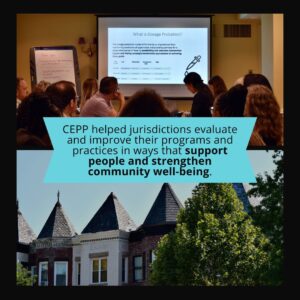 CEPP continued working with several counties in Minnesota to advance the dosage probation model that CEPP created in 2011 with the National Institute of Corrections. Dosage probation is an innovative and research-informed approach to supervision that incentivizes behavior change by providing people with an opportunity to earn early discharge if they successfully engage in evidence-based interventions tailored to their criminogenic needs in a “dose” matched to their assessed likelihood of recidivism.
CEPP continued working with several counties in Minnesota to advance the dosage probation model that CEPP created in 2011 with the National Institute of Corrections. Dosage probation is an innovative and research-informed approach to supervision that incentivizes behavior change by providing people with an opportunity to earn early discharge if they successfully engage in evidence-based interventions tailored to their criminogenic needs in a “dose” matched to their assessed likelihood of recidivism.
CEPP is also working with the Colorado Department of Public Safety on the Crime Prevention Through Safer Streets Grant Program, a new initiative to evaluate and design safer streets and neighborhood models that discourage crime, revitalize community image, and establish place-specific crime prevention strategies that account for geographic, cultural, economic, and social characteristics of the target areas.
8. CEPP created critical resources to inform the field and advance change.
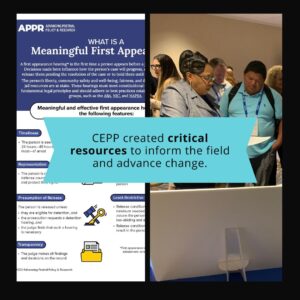 We added several important new resources to our extensive library this year. Since APPR launched in 2019, we have worked to develop a model of what a comprehensive, legal, evidence-based, and community-centric pretrial system would look like. The APPR Roadmap for Pretrial Advancement is the culmination of that work. It lays out strategies for improving pretrial systems, enhancing community safety and well-being, and advancing racial equity. APPR also created our Meaningful First Appearance Overview & Checklist, a practical guide to fundamental legal principles related to first appearances and a checklist for prosecutors, defense counsel, pretrial services, and judicial officers to ensure they uphold those principles.
We added several important new resources to our extensive library this year. Since APPR launched in 2019, we have worked to develop a model of what a comprehensive, legal, evidence-based, and community-centric pretrial system would look like. The APPR Roadmap for Pretrial Advancement is the culmination of that work. It lays out strategies for improving pretrial systems, enhancing community safety and well-being, and advancing racial equity. APPR also created our Meaningful First Appearance Overview & Checklist, a practical guide to fundamental legal principles related to first appearances and a checklist for prosecutors, defense counsel, pretrial services, and judicial officers to ensure they uphold those principles.
You’ll see even more from us in 2023, including a series of white papers to guide policy related to release decisions, returns to prison, and the impact of homelessness on incarceration. For now, check out all of CEPP’s resources on our website.
9. CEPP achieved its goal of working with practitioners in all 50 states.
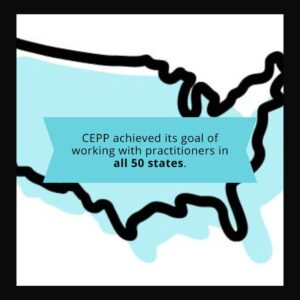 It is official: CEPP has worked with practitioners in all 50 states! To commemorate this occasion, we began spotlighting our local work in our monthly newsletter. From helping implement pretrial system improvements in Wake County, North Carolina, to dosage probation implementation in three jurisdictions in Minnesota; from evaluating pretrial assessment in Monterey County, California, to developing a racial and ethnic disparities strategy in La Crosse County, Wisconsin—CEPP has partnered with state and local governments in 127 counties across the country to create a world where justice enhances well-being for all.
It is official: CEPP has worked with practitioners in all 50 states! To commemorate this occasion, we began spotlighting our local work in our monthly newsletter. From helping implement pretrial system improvements in Wake County, North Carolina, to dosage probation implementation in three jurisdictions in Minnesota; from evaluating pretrial assessment in Monterey County, California, to developing a racial and ethnic disparities strategy in La Crosse County, Wisconsin—CEPP has partnered with state and local governments in 127 counties across the country to create a world where justice enhances well-being for all.
Learn more about all of CEPP’s projects on our website.
10. CEPP’s staff—and the range of expertise and skill sets we bring to support the criminal justice field—grew tremendously this year.
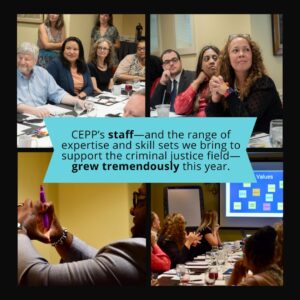 CEPP had the pleasure of welcoming five new staff members in 2022, and we will continue to expand our team in 2023, including new members involved in our justice-impacted women’s work and the new Community Supervision Resource Center. We look forward to adding these additional experts to the CEPP team.
CEPP had the pleasure of welcoming five new staff members in 2022, and we will continue to expand our team in 2023, including new members involved in our justice-impacted women’s work and the new Community Supervision Resource Center. We look forward to adding these additional experts to the CEPP team.
Learn more about our work and backgrounds on our Team page.
___________________________________________________
Keep watching this space as there is more important work to come from CEPP in the new year. If you would like to learn more about CEPP, check out our one-pager. If you would like to work with CEPP on a project in your jurisdiction, contact us.
